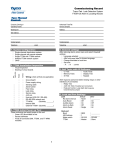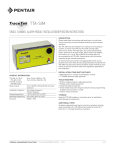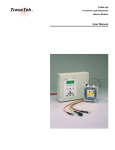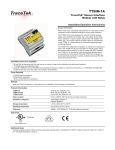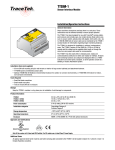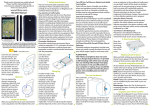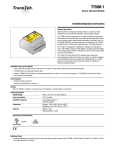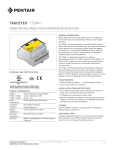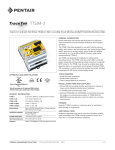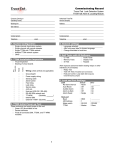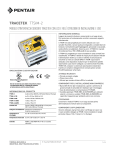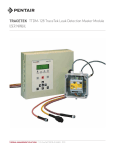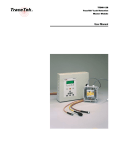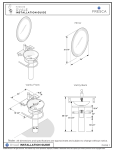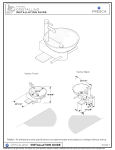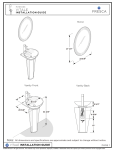Download TTA-SIM Installation Instructions
Transcript
TTA-SIM TraceTek® Single Channel Alarm Module R Installation/Operation Instructions General Information Please read these instructions and keep them in a safe place. These instructions must be followed carefully to ensure proper operation. The TTA-SIM must be installed in an ordinary (non-hazardous) location. It may be used with any TraceTek sensing cable, point sensor and/or normally open, dry contact devices (float switch, pressure or vacuum switch, optical probe with adapter, limit switch, etc.). Up to 150 m (500 ft) of sensing cable can be monitored by the TTA-SIM. Contact factory for information regarding longer monitoring distance. An external disconnect device and appropriate branch circuit protection (no more than 20 amp rating) should be provided for the TTA-SIM. The disconnect device should be clearly marked as such. Follow all national and local codes and regulations applicable to the installation. Installation Items (not supplied) • Wall fasteners for surface mounting (four screws) • TT-RS485 telemetry cable (optional) Tools Required • Drill for making conduit / cable gland entries • Phillips (cross-head) screwdriver • Small flat-blade screwdriver • Small needle nose pliers (required only for device programming if digital communication is used) • Tools to mount enclosure Storage Keep the TTA-SIM modules in a dry place prior to installation. Avoid damage to components. Product Information TTA-SIM-1A-120 & TTA-SIM-2-120 TTA-SIM-1A-230 & TTA-SIM-2-230 96 to 132 Vac, 50/60 Hz, 3 W 216 to 253 Vac, 50/60 Hz, 3 W Relay contacts Form C (SPDT), 250 Vac/30 Vdc at 2 Amps maximum Installation categories Overvoltage Category II Pollution Degree 2 Storage temperature –18°C to 60°C (0°F to 140°F) Operating temperature 0°C to 50°C (32°F to 122°F) Enclosure NEMA 1; IP20 Additional Items An agency-approved zener barrier must be used where sensing cable connected to the TTA-SIM will be located in Class1 Div 1 (Zone 0 or 1 in Europe) Hazardous Locations. 2 TTA-SIM Single Channel Alarm Module Installation/Operation Instructions Installing the TTA-SIM Note: To avoid damage to the TTA-SIM, store the unit in its packaging until ready to install. Important: The TTA-SIM is an electronic unit. Take the following precautions to avoid damage to electronic components: Selecting the mounting position • Handle with care and avoid mechanical shock and impact • Keep dry • Avoid exposure to static electricity • Avoid contact with metal filings, grease, pipe dope and other contaminants Choose a location where the module will be protected from the elements, temperature extremes or heavy vibration. The TTA-SIM is designed to be wall mounted at any location as long as it does not create a tripping hazard or expose the TTA-SIM to impact damage. Mounting the TTA-SIM • Plan cable/conduit alignment and drill holes as necessary. Cable entries should all be located in the open space at the right hand of the TTA-SIM (see Figure 2). A typical installation will require holes to accommodate the following cabling: - Incoming power supply - TraceTek sensor leadwire - [optional] telemetry cable (for RS-485 communication) - [optional] cable for relay contacts to remote alarm TTSIM-1A (or TTSIM-2) unit Relay unit Power terminals Space available for cable entries • Secure the TTA-SIM enclosure to any convenient vertical surface using the four corner mounting holes and hardware suitable for the selected surface. • Rough-in conduit as required and pull the cables for power and telemetry. Leave approximately 20 cm (8 in) for connection to TTSIM terminals. Pull in the sensor circuit leader cable. Figure 2. Cable entry locations Note: Rough-in and final connections do not have to be completed at the same time, however, make sure to replace the cover and tighten the cover screws if the enclosure will be left in a partially installed condition overnight or longer. Power Supply Options The TTA-SIM has two power supply options available. Depending on the version being installed and local regulations, the wiring requirements may vary. In all cases, be sure that each TTA-SIM receives supply voltage from one and only one source. Phase Important: Power supply voltage must be within range specified on TTA-SIM label (located on inside of enclosure cover; the information is also located on TTSIM top label). Connections for Power Power and ground (earth) connections to the TTA-SIM are made using the large cage-clamp power terminal blocks at the right end of the DIN rail as shown in Figure 3. Cut back the power wires to fit and strip to expose approximately 6 mm (1/4 in) of conductor. Push the tip of a small flat-blade screwdriver into the cage clamp actuator to open the terminal, then insert the wire into the terminal and release the clamp by removing the screwdriver. Note: In order to provide maximum electrostatic discharge protection, and to be CE compliant, the TTA-SIM must be grounded. Figure 3. Power connections Neutral Ground (earth) 3 TTA-SIM Single Channel Alarm Module Installation/Operation Instructions Sensor connections (R G Y B) Leader Cable Connections for Sensor The TTA-SIM can be used with any of the TraceTek family of sensing cables including TT1000, TT3000, TT5000 and TT5001, as well as float switches and point probes. Connect the TraceTek leader cable to the lever operated sensor terminals on the relay unit as shown in Figure 4 and the following table. Note: To connect a wire to a lever operated terminal, use a small flatblade screwdriver to press down on the lever. Insert the wire (stripped approx. 6 mm [0.25”]) into the opening in the terminal block, then release the lever. Terminal Color R Red G Green Y Yellow B Black Item Red / Green Sensor Cable Loop Figure 4. Sensor Connections Yellow / Black Sensor Cable Loop Connections for Alarm Relay (Optional) Common Connections to the TTA-SIM relay are made using the lever operated cage-clamp terminals located on the relay unit (see Figure 5). The software programmable TTA-SIM relay contacts may be used for local or remote annunciation, to control a valve or other device, or for connection to a control automation system contact input. The relay can be programmed to alarm on leak only or on either leak or sensor fault. The relay can also be programmed to be ON (coil energized) or OFF (coil de-energized) to signal an alarm (see table below). The relay can be programmed using a TTDM-128 (see TTDM-128 User Manual). Programmed Alarm State Alarm Condition On (default) No alarms Alarm Loss of power No alarms Off Status at Terminals 10-11 11-12 closed open open closed closed open open closed Alarm closed open Loss of power closed open Connections for Telemetry (Optional) Telemetry connections to the TTA-SIM are made using the screw terminals on the TTSIM unit itself (see Figure 6). Cut back the wires to fit and strip to expose approximately 6 mm (1/4 in) of conductor and make the connections. Be sure to connect the shield as indicated. Terminal Color Item 13 — Shield Drain Wire 14 Black RS-485 (–) 15 Red RS-485 (+) 16 — Shield Drain Wire 17 Black RS-485 (–) 18 Red RS-485 (+) Figure 5. Alarm Relay Connections Telemetry connections Shielded twisted pair from Host or previous TraceTek module Shielded twisted pair to next TraceTek module Figure 6. Telemetry Connections Normally Closed Normally Open 4 TTA-SIM Single Channel Alarm Module Installation/Operation Instructions Communications setup Note: This section can be skipped if serial communication is not being used. If the TTA-SIM will be connected to a TTDM or other host system using RS-485 serial communication, the end of line (EOL) jumper and network address must be set. Jumper EOL EOL Jumper 18 21 18 21 • On the last TTA-SIM in the network communication circuit, place the jumper on the two pins closest to the EOL mark as shown in Figure 7(a). • On all other TTA-SIMs or TTSIMs in the network, place the jumper as shown in Figure 7(b). RATING: 120Vac ±10% 50/60 Hz 3VA 18 (a) 21 22 23 24 AC 17 AC 16 AC 15 AC 14 SHLD RS– RS+ 13 Leak 24 SHLD RS– RS+ 23 AC 22 Power Network Address 21 AC 18 AC 17 Service Service Power 16 SHLD RS– RS+ 15 Leak 14 SHLD RS– RS+ 13 The End of Line Jumper on the TTSIM-1A or TTSIM-2 unit must be set in the correct position as follows (use a small needle nose pliers to grasp the jumper): AC Place the End of Line Jumper in the correct position RATING: 120Vac ±10% 50/60 Hz 3VA Network Address (b) Figure 7. End of Line Jumper for last TTSIM (a) and all other TTSIMs (b) Network Address Assignment To set the TTA-SIM network address, repeat the following procedure for each TTA-SIM. Perform the complete procedure one module at a time: • Using a small needle nose pliers, place the TTA-SIM configuration jumper in the CFG position, as shown in Figure 8(a). • Using the TTDM-128 or host system, assign the new TTA-SIM address (refer to the TTDM-128 User Manual or the TraceTek System Integration Manual for instructions). • Place the configuration jumper in the normal operating position, as shown in Figure 7(b), or remove it completely (the jumper is not required in normal operation). 3 4 4 8 4 11 12 8 Jumper J6 (a) 10 CFG Jumper CFG N.O. 2 COM 1 CFG N.C. 12 BLK 11 YEL 10 Alarm Relay Sensor Cable RED 4 N.O. BLK 3 COM YEL 2 N.C. GRN 1 50/60 Hz 3VA Alarm Relay GRN 50/60 Hz 3VA Sensor Cable RED When used in a communication network, each TTA-SIM module must have a unique address assigned to it in the range 001 to 127. All TTASIM units are shipped from the factory with their network address preset to a value above the range of valid addresses, in order to prevent communication conflicts during system startup and configuration. Each TTA-SIM must therefore be configured to a unique address before it can communicate with the TTDM-128 or other host. J6 CFG (b) Figure 8. CFG jumper position for configuration mode (a) and normal operation (b) 5 TTA-SIM Single Channel Alarm Module Installation/Operation Instructions RX (Yellow) Each TTA-SIM is tested and calibrated at the factory. An operating TTA-SIM runs a continuous self check routine and reports any discrepancies to the TTDM-128 or host computer. If the TTA-SIM or the network wiring fails in such a way that the TTA-SIM cannot communicate with the host, then the host reports the failure as a communications failure. TX (Yellow) 13 14 15 16 17 18 21 22 AC No user maintenance is required! There are no user adjustments or calibrations that can be performed in the field. AC Operating Instructions: TTA-SIM-1A 23 24 Power (Green) Network Address Leak Alarm Relay 1 2 3 4 N.C. BLK RED GRN YEL Sensor Cable The green Power LED will be ON and will blink once every 5 seconds when the TTA-SIM is powered and fuctioning correctly. Table 1 lists various sensor status conditions and possible corrective actions. Table 2 lists communication status conditions (applicable when the TTA-SIM is used in a network system). AC RATING: 120Vac ±10% 50/60 Hz 3VA TTSIM-1A-120 5 6 7 8 9 10 COM N.O. Service Power Status Indicators There are 5 LED’s on the TTA-SIM-1A circuit board to indicate: power, communications (inbound and outbound), sensor status (leak detected and trouble). See Figure 9. AC SHLD RSñ RS+ Service (Yellow) SHLD RSñ RS+ Leak (Red) 11 12 Figure 9. TTA-SIM-1A LED positions (all LEDs are located on the TTSIM unit) Table 1. TTA-SIM-1A LED operational status indications LEAK SERVICE FLASH INDICATION Leak detected. Check sensor for leak or spill. ON Leak alarm has been reset by operator but the leak condition still exists FLASH The sensor needs servicing. Check sensor and leadwires/jumpers for continuity or contamination. Table 2. TTA-SIM communication status indications (only active if connected to a network) TX RX INDICATION FLASH FLASH Unit is communicating normally with TTDM-128 or host. OFF FLASH Unit is receiving communication from TTDM-128 or host, but is not responding. OFF ON RS-485 communication wires are reversed OFF OFF Unit is not communicating with TTDM-128 or host. 6 TTA-SIM Single Channel Alarm Module Installation/Operation Instructions Operating Instructions: TTA-SIM-2 No user maintenance is required! There are no user adjustments or calibrations that can be performed in the field. RX (Yellow) Each TTA-SIM is tested and calibrated at the factory. An operating TTA-SIM runs a continuous self check routine and reports any discrepancies to the TTDM-128 or host computer. If the TTA-SIM or the network wiring fails in such a way that the TTA-SIM cannot communicate with the host, then the host reports the failure as a communications failure. TX (Yellow) Service (Yellow) 21 18 Network Address 22 AC 17 23 INPUT: 92 - 132 Vac 50/60 Hz 3 VA Ft M Reset pushbutton The green Power LED will be ON and will blink once every 5 seconds when the TTA-SIM-2 is powered and fuctioning correctly. Table 3 lists various sensor status conditions and possible corrective actions. Table 4 lists communication status conditions (applicable when the TTA-SIM is used in a network system). 1 2 3 4 N.C. TTSIM-2-120 5 6 7 8 9 10 COM N.O. Alarm Relay BLK GRN YEL Sensor Cable RED Power (Green) 24 AC 16 AC 15 SHLD RSñ RS+ Leak (Red) Status Indicators There are 5 LEDs on the TTA-SIM-2 to indicate: power, communications (RX=inbound and TX=outbound), sensor status (leak detected and trouble). There is also a Reset pushbutton which is used to acknowledge or reset alarms or for updating the location display. See Figure 10 for the location of the LEDs and RESET pushbutton. 14 SHLD RSñ RS+ 13 11 12 Figure 10. TTA-SIM-2 LED positions (all LEDs are located on the TTSIM unit) Table 3. TTA-SIM-2 LED operational status indications LEAK INDICATION USER ACTION FLASH SERVICE Leak detected. Check sensor for leak or spill. Preset reset to acknowledge ON Leak alarm has been reset by operator but the leak condition still exists Press reset to clear alarm once leak is cleaned up The sensor needs servicing. Check sensor and leadwires/jumpers for continuity or contamination. Press reset to clear once problem is corrected FLASH Table 4. TTA-SIM communication status indications (only active if connected to a network) TX RX INDICATION FLASH FLASH Unit is communicating normally with TTDM-128 or host. OFF FLASH Unit is receiving communication from TTDM-128 or host, but is not responding. OFF ON RS-485 communication wires are reversed OFF OFF Unit is not communicating with TTDM-128 or host. Selecting location measurement units The TTA-SIM-2 can be configured to display leak location in either feet or meters. To select the desired units: 21 18 Network Address 22 23 24 AC 17 AC 16 AC 15 SHLD RSñ RS+ Units indicator INPUT: 92 - 132 Vac 50/60 Hz 3 VA Ft M Reset pushbutton 1 2 3 4 N.C. TTSIM-2-120 5 6 7 8 9 10 COM N.O. Alarm Relay BLK GRN YEL Sensor Cable RED • A small vertical bar in the LCD will appear next to either the Ft or M label. Press (but do not hold) the RESET button to select the desired units. When the vertical bar is next to the desired units, press and hold the RESET for 3 seconds to accept the setting and return to normal operation, 14 SHLD RSñ RS+ 13 • Press the RESET button and hold it for approximately 3 seconds, until the display shows “Unt”. 11 12 Figure 11. RESET pushbutton and units indicator locations 7 Tyco Thermal Controls Worldwide Headquarters 300 Constitution Drive Menlo Park, CA 94025-1164 USA Tel: (800) 545-6258 (within US) (650) 216-1526 Fax: (800) 527-5703 (within US) (650) 474-7517 E-mail: [email protected] www.tycothermal.com Important: All information, including illustrations, is believed to be reliable. Users, however, should independently evaluate the suitability of each product for their particular application. Tyco Thermal Controls makes no warranty as to the accuracy or completeness of the information, and disclaims any liability regarding its use. Tyco Thermal Controls’ only obligations are those in the Tyco Thermal Controls Standard Terms and Conditions of Sale for this product, and in no case will Tyco Thermal Controls or its distributors be liable for any incidental, indirect, or consequential damages arising from the sale, resale, use or misuse of the product. Specifications are subject to change without notice. In addition, Tyco Thermal Controls reserves the right to make changes – without notification to Buyer – to processing or materials that do not affect compliance with any applicable specification. Tyco, TraceTek and the TraceTek logo are trademarks or registered trademarks of Tyco Thermal Controls LLC or its affiliates. MODBUS is a trademark of Gould, Inc. OptoMux is a trademark of Opto-22. Metasys is a trademark of Johnson Controls. ©2004, 2005 Tyco Thermal Controls LLC H57541 04/05 TTA-SIM Single Channel Alarm Module Installation/Operation Instructions







